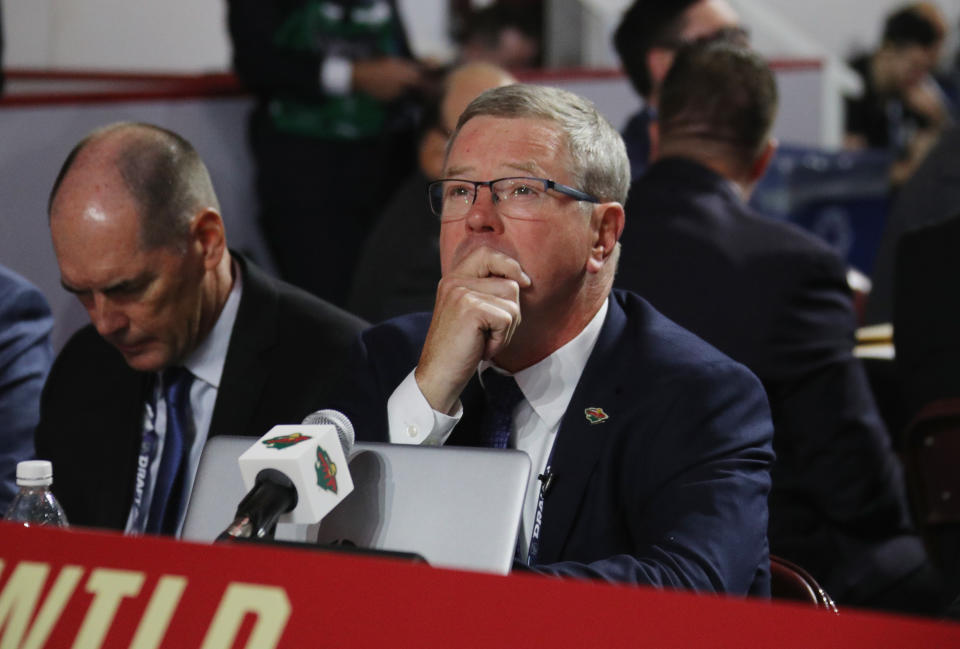Why Paul Fenton got axed by the Wild after just one season

Paul Fenton wasn’t here for a long time, nor a good time. Very short and very bad, actually.
Minnesota’s now-former general manager was canned on Tuesday after just one season at the helm. One season. In GM years, that’s about four minutes — a truly impressive feat.
Impressive in the worst possible way, of course. It took Fenton nearly a quarter-century to reach the pinnacle of NHL front-office positions, and all that was erased after 14 months of consistently bad hockey and financial decisions. The shocking part of all this isn’t that Fenton was let go, but how soon he was axed from a position where it’s not uncommon for even middling talents to last for five-plus years or more.
If you’re looking for someone to blame aside from the transaction trigger-puller himself, look no further than Wild Craig Leipold who publicly raked himself over the coals for hiring Fenton in the first place.
“I missed it, and this is on me. I don’t like the fact that it didn’t work out. Paul is a really strong, strategic scout, identifies talent, understands development, all of that, but there were parts of his role that just wasn’t working out to my satisfaction,” according to Michael Russo of The Athletic.
Craig Leipold addressed the media earlier about today's news 👇 pic.twitter.com/7UHcTRRJgX
— Minnesota Wild (@mnwild) July 30, 2019
So how did a “really strong, strategic scout” who “identifies talent, understands development, all of that ...” so quickly lose the faith and confidence of the guy that hired him just over a year ago?
According to Leipold, it wasn’t so much Fenton’s bad hockey decisions as it was his bad management skills — both crucial to the success of an NHK general manager, one would think.
“It was the other portion of being a general manager — the organizational, the strategic, the management of people, the hiring and motivating of the departments,” Leipold said.
“When I talk about not being a fit (for the organization), that’s what I’m referring to.”
Leipold seemed to be hinting at Fenton’s lack of leadership qualities as the primary reason for the latter’s dismissal. Leipold insisted there was “no final straw” and that the situation was instead a result of a bunch of “smaller issues just building up,” according to Russo, adding that Leipold admitted he started to lament his decision to hire Fenton immediately following Minnesota’s end-of-season player exit interviews.
“That was really it. The culture wasn’t the same. I didn’t have the same vibes with our employees in hockey ops, and I think the attitude of some of the players and all the people in the coaching and the locker room and the training room — it was just a feeling that we didn’t have the right leader for our organization.”
It’s pretty damn clear that a majority of the key stakeholders in and around the organization — players, coaches, support staff and the like — were less than inspired and even completely fed up with Fenton’s amateurish leadership and management ability and style.
And most of Fenton’s hockey transactions over the past year have been anything but astute. After wading through the steaming dumpster fire that is Fenton’s 2018-19 transaction history, three fate-sealing moves stand out above the rest.
July 2018: Inked Jason Zucker to a five-year, $27.5-million deal
Zucker came off a career 2017-18 campaign where he posted 33 tallies and 64 points and Fenton promptly doled out a large contract to a 26-year-old winger with one 30-goal season under his belt.
Attempting to keep Zucker around long-term wasn’t problem — overpaying a middle-six winger and then trying to trade him several times throughout the season and letting that become public was the total dereliction of duty on Fenton’s part.
January 2019: Traded Nino Niederreiter to Carolina for Victor Rask
This was a horrendous move from the beginning and became even more obviously terrible after Niederreiter began to thrive and produce at career-best rates in Raleigh.
July 2019: Signed UFA Mats Zuccarello to five-year, $30-million deal
Signing a 32-year-old to a long-term contract has literally never worked, why would it now?
These major acquisitions combined with a bunch of minor, head-scratching moves, an inability to resolve a plethora of salary cap issues, and the team’s failure to escape from non-playoff purgatory. It all contributed to sealing Fenton’s fate so swiftly.
Fenton was the wrong hire, no doubt about it, so let’s not forget to dump a hefty amount of blame on the guy who actually made that decision.
Owner Craig Leipold should be held fully accountable for all of this — the initial hire of Fenton, putting pressure on his former GM to “stay competitive” rather than go all-in on a scorched earth-style rebuild, and not realizing sooner that the two weren’t anywhere close to being on the same page.
A list of potential replacement candidates which surfaced Wednesday should have Wild fans and those in the organization feeling even more uneasy over their team’s future with Leipold at the helm.
Hearing some names emerge from my sources as possible candidates for Wild GM job: Ron Hextall (as @RussoHockey has already reported), Tom Fitzgerald, Dean Lombardi, Dave Nonis, Bill Zito and Peter Chiarelli.
No word yet on who has been contacted.— Dave Schwartz (@Dave_Schwartz) July 31, 2019
“I missed it, and this is on me.”
The owner was correct in that evaluation, at least.
More NHL coverage from Yahoo Sports

 Yahoo Sports
Yahoo Sports 


